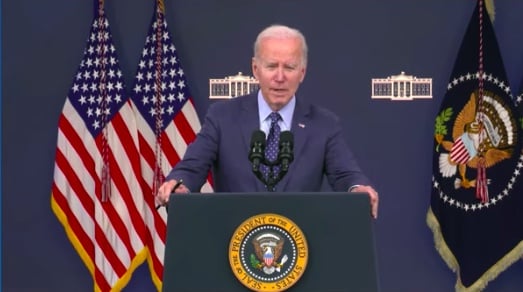President Biden is set to tout his proposed budget for the 2024 fiscal year at a union hall in Philadelphia on Thursday.
The White House estimates that the President’s proposed budget would cut the deficit by nearly $3 trillion over 10 years through savings and tax increases on those earning more than $400,000. It also creates a new minimum tax on billionaires and raised the corporate tax rate to 28%.
That the President is set to push his plan in Pennsylvania, the state that locked in his 2020 electoral victory, and in particularly at a union hall, suggests his proposal is part of a bigger political push to connect with working class voters.
Biden has not yet officially announced he’s running for reelection in 2024, but First Lady Jill Biden suggested it was only a matter of time during an interview Friday. “He’s not finished what he’s started,” she said while traveling in Kenya. “And that’s what’s important.”
Many of the plans in Biden’s budget proposal are unlikely to become law, however, as tax increases of any kind will almost certainly be voted down in the Republican-led House.
But in focusing on Medicare, Biden is reportedly seeking to sharpen how he contrasts with Republicans and position himself as a defender of social safety net programs. It’s a strategy that targets both his likely reelection bid and the anticipated showdown with Republicans over raising the debt ceiling to avoid default.
The President’s budget proposal is reportedly the “starter’s gun” in the negotiations with Republicans over raising the debt limit, ratcheting up pressure on House Speaker Kevin McCarthy (R-CA) to unveil his own detailed budget plan.
In an op-ed published in The New York Times on Tuesday, Biden wrote, “For decades, I’ve listened to my Republican friends claim that the only way to be serious about preserving Medicare is to cut benefits, including by making it a voucher program worth less and less every year. Some have threatened our economy unless I agree to benefit cuts. Only in Washington can people claim that they are saving something by destroying it.”
GOP leaders have said they won’t seek cuts to Medicare or Social Security. However, they have faced challenges in seeking to reach consensus on the budget. Republican leaders generally oppose tax increases but have not yet united behind a plan to reduce federal deficits. They have called for deep cuts to a range of federal programs, though, including foreign aid and funding for low-income Americans.
If Congressional lawmakers take raising taxes and cutting Medicare, Social Security, defense and veterans programs off the table, they would need to cut 85% of spending in all other categories to balance the budget in 10 years, according to the non-partisan Committee for a Responsible Federal Budget, which aims at reducing deficits.
Senate Budget Committee Chairman Sheldon Whitehouse (D-RI) said on Wednesday that it’s unclear yet whether Senate Democrats will put forth their own budget resolution or simply back Biden’s budget proposal.


